Damn, Russia's getting beat up real bad. Maybe they will break and sign an armistice with Germany, starting a second great offensive in the west? And if so, will they beat the arrival of the US Army?
The Great War (mod 1914)
- Thread starter Kurt_Steiner
- Start date
-
We have updated our Community Code of Conduct. Please read through the new rules for the forum that are an integral part of Paradox Interactive’s User Agreement.
You are using an out of date browser. It may not display this or other websites correctly.
You should upgrade or use an alternative browser.
You should upgrade or use an alternative browser.
What, you make russians retreat so that you can annex more land when both germans and russians surrender?
Forget that. I'd pay Airline prices to see that.
Airline prices? Meh. For a movie like that, you should really pay an average American's share of the national debt.
Hmm...that gives me an idea to pay off the national debt.
Chapter sitxy-four: The Crucible
The artillery gathered for the Allied counter attack proved to be decisive in suppressing the German defenders. Furthermore, the hastily dug trenches were not like that ones who had stopped the offensive of the Somme or the ones of the Hindenburg line. Thus, when the offensive began on the early hours of May 6, 1917, the violence of the assault surprised the German command, which thought that the Allies were a spent force. Canadian and British artillery opened fire a few minutes before the attack, and then the infantry of the First Army (Plummer) charged through no man's land, pouring the German trench line and destroying a number of German strong points. Field guns laid down a barrage that advanced 100 yards (91 m) every three minutes, while medium and heavy howitzers established a series of standing barrages further ahead, against suspected defensive systems. The German divisional artillery, despite heavy losses, were able to keep firing; however, as the Allied infantry advanced, it overran many of the German guns because there was no means of moving them to the rear on account of many of the horses being killed in the initial attack.
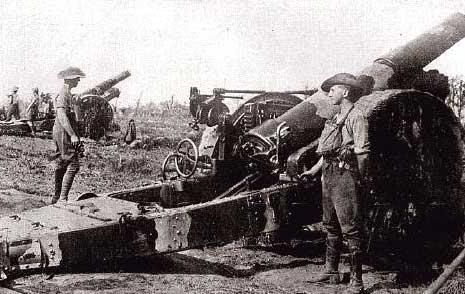
One of the Australian heavy howitzers used during the initial barrage.
Then, as three French armies smashed through the sourthern flank of the German salient, and with the Kronprinz Army Group reatreating, Luddendorf stopped the arrangements for the offensive against Flanders, trying to find forces to bolster the frontlines, but in vain. Then, as the German troops began to withdraw towards Amiens, Foch released the six armies under his direct command against the enemy lines in Champagne and Verdun, but it could not proceed beyond the first line of German trenches. Aware of the delicate state of the morale of his soldiers, that had attacked just because of the dangerous situation, Foch suspended the attack with that limited success instead of pressing against all odds. Boldened by the success that ended the German threat, while Rawlinson's men marched through the streets of Le Havre, Haig and Foch, sensing the German weakness, attacked the German rearguard which blocked the way to Amiens. Attacking amidst heavy rains, the Allies made excellent progress as the exhausted German forces retreated in disorder. Within a few hours, the Allies divisions had advanced in some parts of more than three miles.
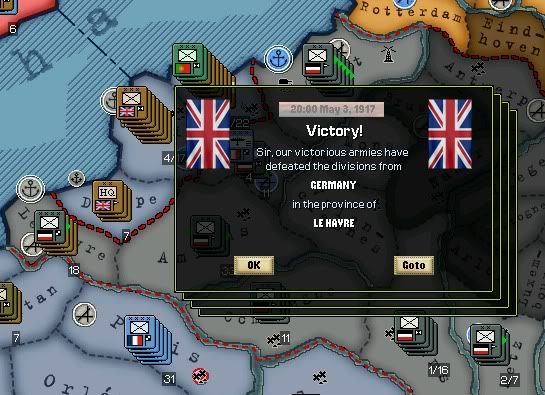
General Lomax's Third Army was moving in support of Rawlinson, finding little resistance, too, and Haig was swift in ordering Lieutenant-General Kavanagh’s Cavalry Corps to enter the fray. Kavanagh’s horsemen galloped forward with urgency and passed through the gap in the German line created by the infantry. Pursuing the fleeing infantry, the cavalrymen enjoyed the momentary resumption of mobile warfare, cutting down desultory German rearguards while the frontline returned and moved beyond the old Somme battefield. However, as the German reserves arrived in force, they inflicted severe lossess on Kavanagh’s cavalry, compelling its withdrawal. Meanwhile, the infantry had entrenched solidly enough to conclusively repel a number of German counterattacks. The operation undertaken by General Lomax on 9th May was the biggest advance made by the British Army in a single day on the western front since the war began. To Haig’s joy, the cavalry had played an important part in exploiting and expanding Third Army’s initial gains.
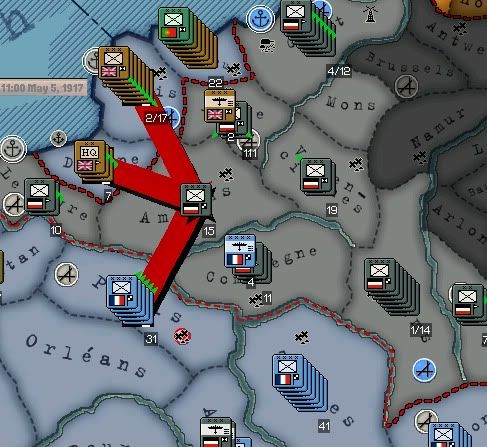
By May 9th, the frontline was again in the original lines previous to the beginning of the Kaiserschlacht. A tremendous bloodbath took pace in those twenty days of endless battles, but it was by no means over. Both Foch and Haig judged that the German army had been severely weakened. And to prove that, they both agreed on a general offensive in Flanders, Champagne and Verdun. Both generalsl paid no attention to the German counterattack against Amiens. Their forces there had suffered huge losses, true, but reinforcements were comming. Thus, the offensive could develop.
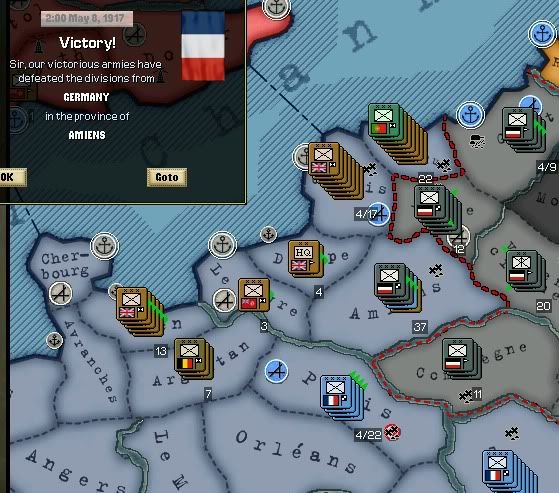
Nevertheless, the Kronprinz's counterattack broke again through the exhausted forces of General Gough while Gouraud advanced towards Compiègne. By May 13th the Germans were again in control of Amiens, albeit in a more dangerous position, as their salient could be attacked from three different sides. It was enough to cause a political turmoil in London.
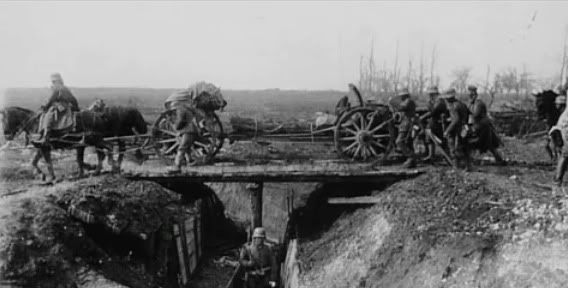
The Germans, again on the move.
@Nathan Madien: And the idea is to help them...
@quaazi: Don't worry. Private Baldrick had a clever idea about the Armistice.
@c0d5579: Lucas and Spielberg are already working on that.
@Agent Larkin: Airport 77 vs Terminator?
@Milites: Actually, it will be Kerensky's salons...
@MastahCheef117: By the time that the German troops in the East arrive to the West, I'll have a nasty surprise for them...
@Enewald: Darn, you discovered my plan to free Finland...:rofl:
Last edited:
So disaster in the east and a much needed victory in the west. Ping-pong the war goes on...
Doh, of course It's just hard to imagine a Weltkrieg Russia without old Nicky...
It's just hard to imagine a Weltkrieg Russia without old Nicky...
@Milites: Actually, it will be Kerensky's salons...
Doh, of course

The Germans, again on the move.
By the way, what are they transporting? I can't really make it out.
By the way, what are they transporting? I can't really make it out.
Probably an artillery piece
Chapter sitxy-five: The Devil's arythmetics
The long month of constant fighting had taken a huge toll in both sides. Even if the first US troops had arrived to France and were organized into a combative force and introduced to in the new warfare tactics, the worrying amount of casualties had caused a political upheaval in London.
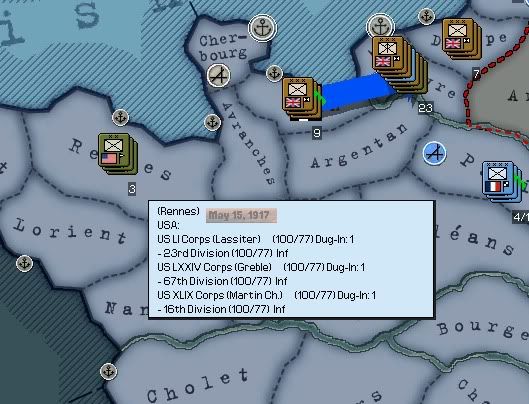
Plumer's 1st Army had suffered 22,700 casualties (a 38% of his fighting force) since the beginning of the counteroffensive and units like the Guards Division and the 43rd "Wessex" were in sorely need of a refit and a rest. The remaining of the BEF were in no better shape, as the two other armies reported a total loss of 40,900 men in those days (a 34% of his fighting force). The South African Corps had been also brutally bleeded (15,100 casualties, that is, a 50% of his fighting force) and was withdrawn from the front; Belgian causalties (18,000, a 30% of his fighting force) and the lack of reinforcements had reduced the tiny brave army to a skeleton force and their divisions hardly mustered half of their original strenght. Even if the German losses were even worse (143,403 casualties), Lloyd George was angered by the failures of the British command and what he termed as "the Butcher's bill".
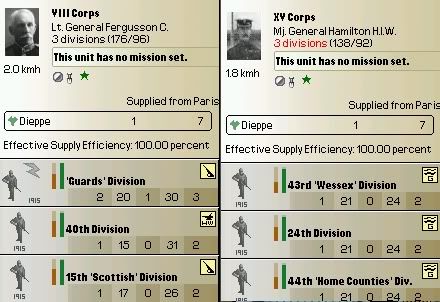
It was during a cabinet meeting that the Prime Minister translated his anger in a quite well-known tirade when he was told by General Robertson that Haig's objective wasn't to win ground, but to destroy the army. After asking which army, if the German or the British, Lloyd George explode:
"I am the one who has told the people a hundred of times that we must win the war, and now I have to look them in the eye. Oh, forgive me, wives and mothers, but I didn't know that our general had a theory that if there were only three Allied soldiers standing on their feet and only one German, then, THEN, we have won the war!".
He was not the only Premier with problems. The casualties had forced Borden, Canada's Prime Minister, to advance to referendum of the Military Service Act, and to extended the vote through the Military Voters Act to overseas soldiers (women serving as nurses were also given the right to vote). The majority won and the Military Service Act became law on May 1st, 1917.
Military service became compulsory for all males between the ages of 20 and 35. Only men in vital wartime production jobs, those who were sick or conscientious objectors (those for whom fighting was against their religious or other beliefs) did not have to join the Forces. When news of the high casualties was reported in Canada, it deterred many from volunteering for service. The war effort needed more soldiers, so on May 10th, 1917, an order-in-council was passed that removed exemptions from the Military Service Act, and the government amended the Act so that there were no exemptions, which left many English Canadians opposed as well. In Quebec, there were more protests and marches against the Act. The damage caused by this measure would be felt deep in the future, leaving Canadians divided and distrustful of their government.
At the same time, in Australia, several anti-conscriptionists such as Tom Barker, editor of Direct Action, and many other members of the Industrial Workers of the World were arrested by the government under the War Precautions Act for their opposition to the recently passed Military Service Act. This, however, did not stop the protests, led by the Catholic Archbishop of Melbourne, Daniel Mannix, the Queensland Labor Premier, Thomas Ryan, Vida Goldstein and the Women's Peace Army. The bitter sectarianism that rose about this issue in both Canada and Australia led to the suspension of the Acts in 1921 and 1922, respectively. (1)
Thus, as Haig pressed for a new offensive -the big push that was to finally end the war-, the Prime Minister was very worried by the result of Haig's "victories". Then General Wilson offered an alternative: to agree to the new offensive under conditions: that the offensive was a success. After all, his supplies, his reinforcements, his ammunition, all came from Britain. And that was under the control of the Cabinet. Thus Lloyd George hoped to keep Haig under control. Knowing the strenght of the Hindenburg line and doubting that after the past battles the Allied forces were in shape to break through the German defensive system, the Primer Minister wanted that no major offensives were undertaken on the western front throughout the remainder of 1917, and thus the Allies would wait until 1918 when the Americans would have deployed a large enough force with decisive consequences. Meanwhile, in other theatres, Lloyd George sought to attack Germany’s allies. The Prime Minister reasoned that defeating the Ottoman Empire would safeguard India from German encroachment, expose Bulgaria and allow the Allies to support Romania. Under such circumstances, the fall of Austria-Hungary would only be a matter of time, and Britain would establish her position as the chief arbiter of the future of the Balkans as well as the Middle East.
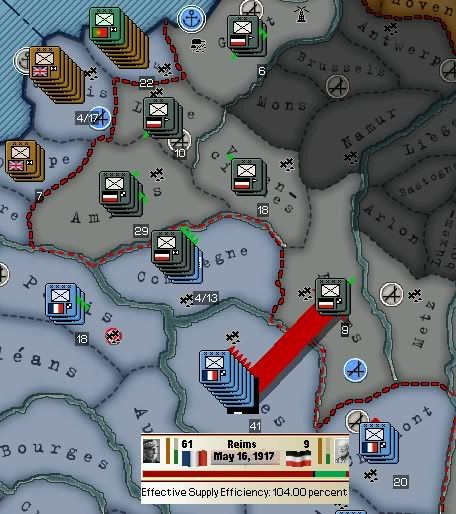
The only problem was that, before Lloyd George could met his French counterpart, Petain was to breach the German lines in the Third Battle of Champagne (May 16-24, 1917), which finally opened the way to Rheims. Foch considered that the German were to crack under the Allied pressure and urged Haig to launch an offensive in the Flanders area. It goes without saying that the British general agreed with great enthusiasm. The BEF was to attack in a two-pronged offensive, aimed against Messines Ridge, which would provide flank security to a general advance towards the next objective: Passchendaele.
Thus started the Third Battle of Ypres, on May 24.
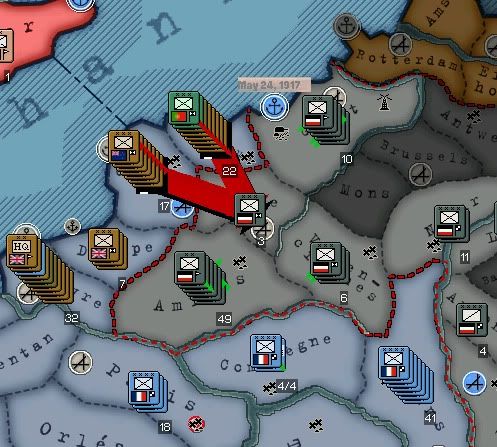
(1) A few years earlier than in OTL.
@Enewald: Old habits die hard
@Milites: But this time the stalemate has been broken by so many casualties...
@Nathan Madien: It's a field gun. As the barrel is not clearly seen, I am not 100% certain. Looking at the shield, I don't think it's a 77mm FK96 n/a (neuer art) field gun (the German equal to the French 75, and the British 18 pounder) Thus, my bets go for a 105mm lFH 98/09 light field howitzer.
@Patukov: Well spotted.
Last edited:
You've got Fritz on the run! Now get to Berlin before the Americans can hog all the glory! 
God, Kurt I don't know Mod 1914 at all, but I can see an epic encirclement at Amiens dawning on the Entente boys.
Over there! Over there! Someone send Truman over there! He will win the war! He will win the war! He will win the war because he's Truman!
...and Britain would establish her position as the chief arbiter of the future of the Balkans as well as the Middle East.
Oh, yeah. Good luck on that, Britain. That should go well.
If someone were to gene-splice TR and Truman then the world would be a much better place.
If someone were to gene-splice TR and Truman then the world would be a much better place.
You get Ross Perot.
Just keep the French and Woodrow Wilson out of things and I'm sure it will go well. With TR in place things are already half way to a better outcome than OTL.Oh, yeah. Good luck on that, Britain. That should go well.
With luck this means that Britain and America tell the French to sodd off on some of their more outrageous demands at Versailles.
You get Ross Perot.
I can't believe next year will mark 20 years since he first ran for President.
With luck this means that Britain and America tell the French to sodd off on some of their more outrageous demands at Versailles.
Why even give the French that honor? If TR had his way, everyone would be meeting at his home in New York to decide the future of the world. Probably to show off that Nobel Peace Prize of his.
Speaking of TR, I wonder if he is keeping Cousin Franklin as Assistant Secretary of the Navy.
Last edited:
Chapter sitxy-six: They called it Passchendaele
But before we return to the battlefield, it's time to mention a replacement in the Allied chain of command. General Sir Hubert Gough, CO of the Fifth Army, was fatally wounded while he was touring the frontline with the eighty-seven year old Field Marshall Lord Frederick Sleigh Roberts (1), the only officer in the British Army whose prestige was greater than that of Kitchener. A veteran of the Second Boer War, Gough became widely known for his command of a relief column during the siege of Ladysmith, but he had became "famous" for his role in the Curragh Incident. A protegée of Haig, Gough had experience a meteoric rise through the ranks during the war, from commanding a brigade in August 1914 to be in charge of the Reserve Army, despite only being a lieutenant general, at the start of the Battle of the Somme in July 1916. In fact, his good luck -and his friendship with Haig- doomed him, as his mistakes during the Battle of the Somme did not cause his inmediate dismissal. Thus, when his Fifth Army failed to hold the line twice (on April and May 1917), it was quite obvious to everybody that his dismissal will follow at once.
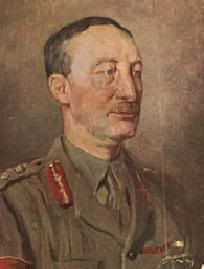
General Sir Hubert Gough (1870-1917)
News of the defeat travelled swiftly and there was popular indignation that the Germans could recover lost ground so easily. The euphoria generated by the defeat of the enemy advance to the Channel and the recovery of Amiens was lost by the reverse of the city. The public opinion raged at the humiliation of the army and moved Lord Northcliffe’s newspapers into a direct charge against the government, with Northcliffe himself melodramatically calling the military setback ‘one of the most ghastly stories in English history’ (2). This sense of outrage was hard to ignore and the War Cabinet questioned why Gough had failed so utterly. Gough, partly a victim of circumstances and party of his own actions, had been aware of the danger of an attack on his front and had warned Haig, but there was little he could do to avoid the incoming defeat: the slow arrival of reinforcements and Gough's contradictory orders forced the Fifth Army to retreat again. Then a German sniper took mercy on him and killed the unlucky General a few days earlier than Lloyd George began his search of a replacement.
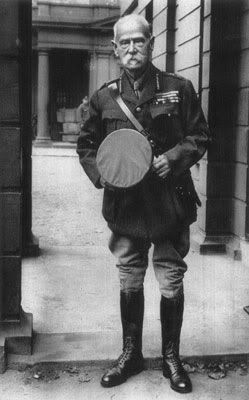
The old but still energetic Lord Roberts, seen here before departing to Flanders.
Gough's body (3) was sent home and General Sir William Birdwood took command of his army. Meanwhile, the big operation in Flanders went on. With the pressure to attack in support of the French ally, and with the support of the formidable voice of support Lord Roberts, Haig prepared for the battle that, this time, would break the German spine: he envisaged a breakthrough that would lead to the capture of Roulers which would be followed by an advance to the north, along the Belgian coast, capturing Ostend and Zeebrugge and forcing the Germans to withdraw. When London asked about the expected casualties that would be incurred during the operation, Haig responded that he anticipated monthly losses that were similar to those sustained during the Somme campaign of 1916, although he hurried to add that he was hopeful that they would be less and that he would approach the battle with caution, and that the nature of the advance would be step-by-step, ensuring at every stage that casualties were kept to minimal levels. Given this statement, Lloyd George was inclined to signal his support, but the Premier required assurances from Robertson that the offensive would be halted if no significant progress was made.
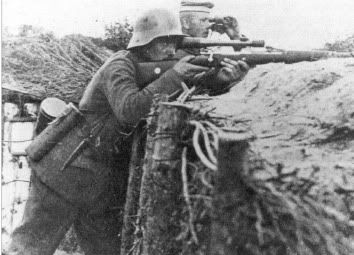
German Scharfschützen Gewehr 98 in use. The sniper has the leather case for the telescopic sight in his belt. This is doubtless a possed foto, as neither man would normally expose his head so blatantly in a front line position by 1916 -the date of the issue of the steel helmet.
The planning for the Flanders offensive was undertaken by General Plumer, the commander of Army Group Flanders. Plumer was a widely respected officer, with a reputation for precise planning and attention to detail, and upon his promotion to command the newly established army group, he brought with him the same senior staff officers in which he had placed his trust so far. Having promised to undertake the offensive step-by-step, Haig chose in Plumer the correct commander to take responsibility for planning the details of the operation. Committed to caution, Plumer benefited from an intricate knowledge of Flanders, having held the same sector of line since the onset of trench warfare. In accordance with Haig’s wishes, Plumer planned for the capture of the Wytschaete-Passchendaele Ridge, the possession of which would allow the British to dominate the area surrounding Ypres.
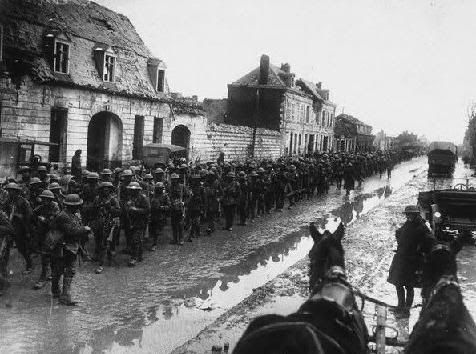
The troops move to the first line under some unexpected, albeit brief, unseasonal rain, which had no effect whatsoever on the offensive
Notably, the sweeping breakthrough originally envisaged by Haig was quietly laid aside in favour of a gradualist approach. Support was to be supplied in the north by King Albert’s Belgian Army, which was to attack tentatively at the Yser Canal, whilst General Horne’s First Army was to provide support by attacking Messines Ridge. Plumer and Horne placed strict limits on their plans, confident that setting modest objectives would ultimately be more productive than pushing their men to reach ambitious targets. They sought to clear the Germans from the Wytschaete-Passchendaele Ridge, culminating in the capture of Passchendaele itself. Seeking to minimise casualties, they chose not to push their infantry too far beyond the range of artillery fire and specified to their artillery commander that the guns’ chief task was the support of infantry rather than the devastation of enemy ground. However, there was a problem with the plan. Due to the hurried nature of the offensive, there attack would be preceded by just a six hour bombardment.
However, this short bombardment surprised the German defenders, who had been greatly reduced, as most of his forces were sent south to help in the "Dash to the Channel". Thus, the Germans lacked the manpower to apply their well-tested defence-in-depth so, by the time the infantry went over the top, at 4am on May 24, most of the forward positions had been utterly destroyed. A creeping barrage covered the infantry as they surged forward along the line. As the Third Army pressed towards Passchendaele and the Second Army towards Messines and Wytschaete, the German line succumbed within 12 hours.
The ANZACs, now commanded by an Australian, Lieutenant-General John Monash, easily forced the dazed German infantry from their positions south of St. Eloi and were making progress down the Ypres-Messines road by the end of the day. Most spectacularly, units from General Horne’s First Army captured Messines Ridge. After the initial attack, German resistance strengthened enormously, and the British were unable to capture Wytschaete that day as planned. Nevertheless, the British had achieved great success. For the cost of just 22,000 casualties, they had advanced everywhere along the ridge and eased the incessant pressure on Ypres.
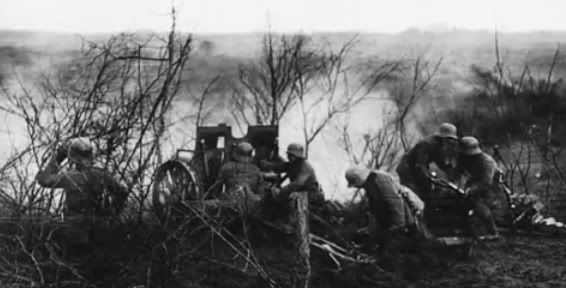
In spite of the fierce resistance, the Germans defenders were outnumbered and outgunned
Maxse was confident that Second Army was in position to continue its advance. Plumer ordered reinforcements to be sent to the area, with the Earl of Cavan’s IV Corps arriving to serve under Maxse. On May 29 (4), Maxse ordered the second phase of the battle to begin. This followed another intense barrage of the re-established German front line, with the salient around Wytschaete being placed under "close attention". The ANZACs and Capper’s VII Corps overwhelmed the defenders of Wytschaete and forced them to withdraw while Cavan’s IV Corps pushed along the Ypres-Comines Canal towards Hollebeke whilst Fanshawe’s V Corps forced the final German defenders from Sanctuary Wood after a severe fight. Then, suddenly, the whole German line crumbled. Unable to hold their trenches, the decimated five German divisions that defended the area could not longer held without reinforcements and its remnats fled from the battlefield. In the next six days the Allied forces advanced, indisturbed, towards Lille, which was finally freed on June 5, 1917.
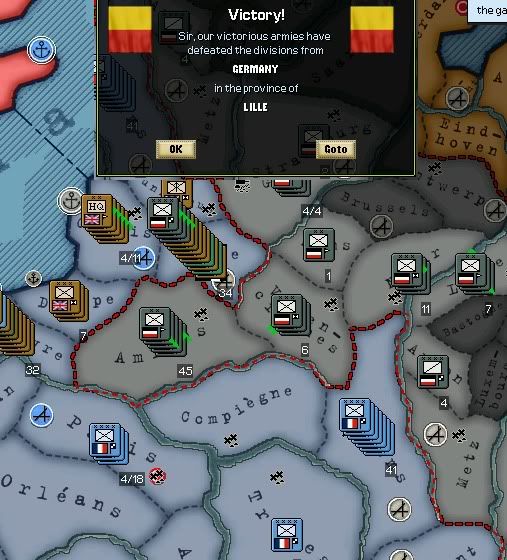
Then, a long awaited event finally took place. The first Mark I tank finally entered into service. Three armored brigades gathered all the tanks of the British army (all in all, nine battalions of the Tank Corps with about 437 tanks) and were attached to the IV Corps (Lt. Gen. Lake), which had been send back to England to recover from the grievous losses suffered at Amiens. Soon the Germans would learn about this new weapon.
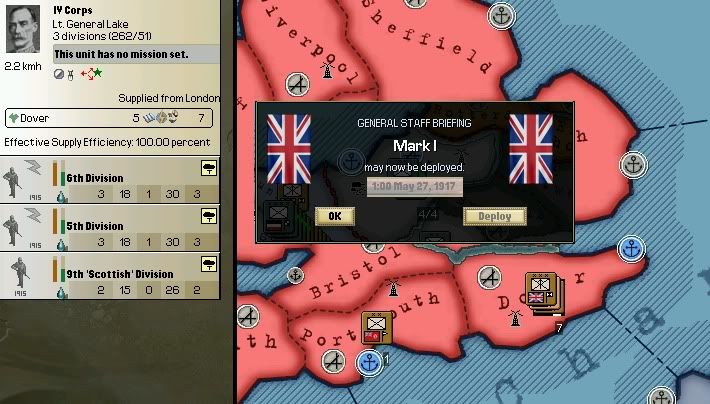
(1) In OTL he died in 1914, but, as I was running out of "classic" heroes after KoK's untimely demise, I decided to give good old Bobs of Kandahar some extra time. In fact, I decided to do that while I was writting this post. Don't despair, even Wolseley might appear somewhere, sometime to be sure "that everything's all Sir Garnet"
(2) My Lord Northcliffe had forgotten, methinks, the old tradition of British disasters (Hastings, Orleans, Cartagena de Indias, Saratoga, Yorktown, Gandamak, Isandhlwana, Majuba, Colenso -5-) that had made the Empire what it was in 1917...
(3) Well, "why killing Gough?", you may ask. In short: because he had already made of fool of himself in Curragh and I wasn't in the mood to give him another chance of doing it again. I kept an eye on him and "allowed", somehow, to do some mishaps at the Somme -albeit at a reduced scale- that he had in OTL Third battle of Ypres (31 July-10 November 1917). Of course, I wasn't going to allow him to repeat that show here and, to avoid further nuisances, used good old Bobs and a stroll to get rid of that troublesome priest... er... General.
(4) That same day, a Tuesday, by the way, a healthy boy was as born at 83 Beals Street in Brookline, Massachusetts.
(5) Nathan, trust me, I'm not trying to drive you mad with all those names. I swear it.
@quaazi: Alàs, but I need the American cannon food... er... manpower to get to Berlin...
@Milites: Well spotted. Even when I closed the gap I couldn't believe my eyes. You (and all the pack) shall see...
@Nathan Madien: Truman? Peti, erase the part of the next update when Fatty Hermann dives his Fokker D VII and puts some bullets into Harry''s head!!!!
Just kidding.
About Middle East: Thanks
@trekaddict: I would prefer that Indy finds the Graal and gives it to Teddy to drink a bit.
@c0d5579: For the life of me, but, when I heard the first time about him, in my youngster days, I couldn't avoid but thinking that Ross was some kind of silly joke that I couldn't grasp is meaning.
trekaddict -2-: Winnie with actual skill for domestic policy? He doesn't need that. Just give him a cigar and he'll do wonders
@El Pip: France will be wisely advised in due moment to do the right thing. Wilson is, right now, considering growing a moustache. And TR... well... just imagine what would happen if some French dared to raise his voice in front of Teddy.
@trekaddict -3: Thank you very much for the reference to Baldrick, because I have a clever idea to keep France calm. There will be a Versailles, of course, but my own Versailles.
@Nathan Madien -2-: I like the idea of meeting at TR's home... "You see that Nobel Prize? Ok, if you happen to open your dirty mouth again, I'm going to stick it right your darned *****!!!!!"
And yes, FDR is still working as Assistant Secretary of the Navy and making friends with many people, like an assistant general-manager of a major shipyard called Joseph P. Kennedy, Sr.
Last edited:

